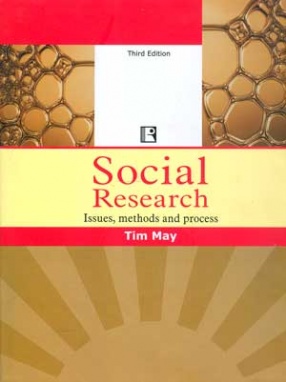Social Research: Issues, methods and process
Synopsis
The fully revised and updated third edition of this hugely popular text incorporates the latest development in the interdisciplinary field of social research, while retaining the style and structure that appealed to so many in the first two editions. Tim May successfully bridges the gap between theory and methods in social research, clearly illuminating these essential components for understanding the dynamics of social relations.
The book is divided into two parts, with Part I examining the issues and perspectives in social research and Part II setting out the methods and processes. Revisions and additions have been made to part I to take account of few ways of thinking about the relationship between theory and research, and values and ethics in the research process. These take on board advances in post-empiricist thinking, as well as the relations between value, objectivity and data collection. Where necessary, recommended reading and references to studies that from the bases of discussions throughout the book have been updated. In Part II, additions have been made to the chapter on questionnaires, and elsewhere new discussions have been introduced, for example, on research on the internet, narratives, case studies and new technologies. The reader will detect many other changes, the intention of which is to aid understanding by staying up-to-date with the latest innovations in social research. The chapters follow a common structure to enable a clear appreciation of the place, process and analysis of each method, and to allow the comparison of their strengths and weaknesses in the context of discussions in Part I.
The clear writing style, chapter summaries, questions for reflection and signposts to further readings continue to make this book the ideal companion to social research for students across the social sciences. In addition, it will be recognized as an invaluable source of reference for those practicing social researchers.
Read more
The book is divided into two parts, with Part I examining the issues and perspectives in social research and Part II setting out the methods and processes. Revisions and additions have been made to part I to take account of few ways of thinking about the relationship between theory and research, and values and ethics in the research process. These take on board advances in post-empiricist thinking, as well as the relations between value, objectivity and data collection. Where necessary, recommended reading and references to studies that from the bases of discussions throughout the book have been updated. In Part II, additions have been made to the chapter on questionnaires, and elsewhere new discussions have been introduced, for example, on research on the internet, narratives, case studies and new technologies. The reader will detect many other changes, the intention of which is to aid understanding by staying up-to-date with the latest innovations in social research. The chapters follow a common structure to enable a clear appreciation of the place, process and analysis of each method, and to allow the comparison of their strengths and weaknesses in the context of discussions in Part I.
The clear writing style, chapter summaries, questions for reflection and signposts to further readings continue to make this book the ideal companion to social research for students across the social sciences. In addition, it will be recognized as an invaluable source of reference for those practicing social researchers.
45.00
40.5
$
50.00 $
Free delivery Wolrdwidе in 10-18 days
Ships in 1-2 days from New Delhi
Membership for 1 Year $35.00
Get it now and save 10%
Get it now and save 10%
BECOME A MEMBER







Bibliographic information